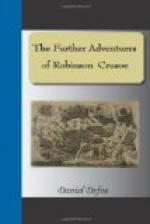I can neither tell how many we killed nor how many we wounded at this broadside, but sure such a fright and hurry never were seen among such a multitude; there were thirteen or fourteen of their canoes split and overset in all, and the men all set a-swimming: the rest, frightened out of their wits, scoured away as fast as they could, taking but little care to save those whose boats were split or spoiled with our shot; so I suppose that many of them were lost; and our men took up one poor fellow swimming for his life, above an hour after they were all gone. The small shot from our cannon must needs kill and wound a great many; but, in short, we never knew how it went with them, for they fled so fast, that in three hours or thereabouts we could not see above three or four straggling canoes, nor did we ever see the rest any more; for a breeze of wind springing up the same evening, we weighed and set sail for the Brazils.
We had a prisoner, indeed, but the creature was so sullen that he would neither eat nor speak, and we all fancied he would starve himself to death. But I took a way to cure him: for I had made them take him and turn him into the long-boat, and make him believe they would toss him into the sea again, and so leave him where they found him, if he would not speak; nor would that do, but they really did throw him into the sea, and came away from him. Then he followed them, for he swam like a cork, and called to them in his tongue, though they knew not one word of what he said; however at last they took him in again., and then he began to he more tractable: nor did I ever design they should drown him.
We were now under sail again, but I was the most disconsolate creature alive for want of my man Friday, and would have been very glad to have gone back to the island, to have taken one of the rest from thence for my occasion, but it could not be: so we went on. We had one prisoner, as I have said, and it was a long time before we could make him understand anything; but in time our men taught him some English, and he began to be a little tractable. Afterwards, we inquired what country he came from; but could make nothing of what he said; for his speech was so odd, all gutturals, and he spoke in the throat in such a hollow, odd manner, that we could never form a word after him; and we were all of opinion that they might speak that language as well if they were gagged as otherwise; nor could we perceive that they had any occasion either for teeth, tongue, lips, or palate, but formed their words just as a hunting-horn forms a tune with an open throat. He told us, however, some time after, when we had taught him to speak a little English, that they were going with their kings to fight a great battle. When he said kings, we asked him how many kings? He said they were five nation (we could not make him understand the plural ’s), and that they all joined to go against two nation. We asked him what made them come up to us? He said, “To makee te great wonder look.” Here it is to be observed that all those natives, as also those of Africa when they learn English, always add two e’s at the end of the words where we use one; and they place the accent upon them, as makee, takee, and the like; nay, I could hardly make Friday leave it off, though at last he did.




